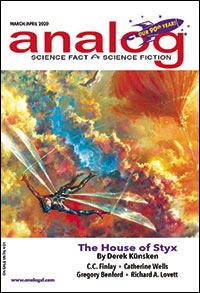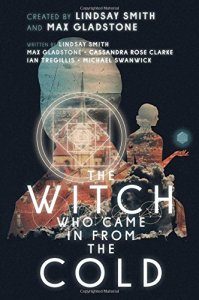Gary K. Wolfe Reviews All These Worlds: Reviews & Essays by Niall Harrison
 All These Worlds: Reviews & Essays, Niall Harrison (Briardene Books 978-1-870824-67-5, £20.00, 394pp, tp) April 2023.
All These Worlds: Reviews & Essays, Niall Harrison (Briardene Books 978-1-870824-67-5, £20.00, 394pp, tp) April 2023.
I suppose it’s way past time for me to stop thinking of Niall Harrison as one of the UK’s bright young critics. His work is meticulous and probing, but his first collection, All These Worlds: Reviews & Essays, which includes pieces from 2005 all the way up until this year and serves as a reminder that Harrison is at the very least due to be welcomed into incipient middle age, fortunately with no evidence of losing that edge of youthful discovery. All These Worlds contains over 50 reviews and three essays, and while a fair number of the titles covered seemed to have had limited visibility here in the States (a few of the earlier reviews are of short stories or magazine issues), what Harrison has to say about them is almost always intriguing. I found it interesting to realize that I had reviewed only about a dozen of the same titles during this period, for example, so I found myself learning not only about several worthwhile books I had missed, but about others for which I’m grateful to Harrison for having saved me the effort. He is generally a balanced and technical reviewer, pointing out what he views as both successes and failures within a given work, but he can also toss off zingers like describing one title as “a fine short story with a disappointing 300-page novel tacked on the back.” It’s a line that would be easy to appropriate for any number of novels.
But reading a collection of reviews in terms of batting averages or overlaps is missing the point. As Harrison points out, “any story knowingly written as SF is a history, encoding a version of the past, assumptions about border and authority and expectation that will never be quite the same from writer to writer” – or, we might add, from reader to reader or critic to critic. So the SF that Harrison read over the last couple of decades isn’t the same SF that you or I read. Comparing notes on authors we’ve both reviewed and admired – Kelly Link, Margo Lanagan, M. Rickert, for examples – leads me to find myself mostly on the same page as Harrison, and that in turn builds trust in his assessments of books I’ve (in an embarrassing number of cases) never even heard of. That trust is further enhanced by Harrison’s acute awareness of factors that influence his own reading of a text. He more or less grew up professionally reading Stephen Baxter, for example, so he begins a review by noting, “There aren’t many times when I’m as aware of the interaction of my critical and fannish gazes as when I’m engrossed in a new Stephen Baxter novel.” Fannish affections or not, he goes on to offer the most convincing argument I’ve seen for the importance of Baxter’s prehistoric Northland trilogy (2010-2012). Harrison is also consciously part of an ongoing critical conversation among his (mostly UK) colleagues, a group that has long seemed both more contentious and more companionable than any US counterpart; the book is peppered with allusions to other critics like Paul Kincaid, Abigail Nussbaum, Maureen Kincaid-Speller, Christopher Priest, Adam Roberts, John Clute, and others. A series of pieces parsing the annual Clarke Award shortlists is especially interesting in this regard.
Harrison may not be given to broad theoretical statements about SF, but he does show a recurring fascination with pivotal dates and historical periods, and the most substantial essay, “Unstable Histories in the Space of Dreams”, focuses on shifting notions of SF history in recent critical works and anthologies. Elsewhere he sees 2001 as a “totemic year,” marking the end of the old genre’s “imagined future,” and another turning point in 2009, with Racefail and Lavie Tidhar’s World SF blog broadening perspectives while the death of this magazine’s publisher Charles N. Brown marked a “generational shift.” A review of an anthology of Japanese SF focuses in part on the three-phase historical model suggested by the editors, while Harrison’s own fascinating essay on Chinese short fiction of the 21st century – he read some 84 stories, cautioning us that they had passed through all sorts of filters before showing up in English translation – identifies no fewer than four periods of Chinese SF since around 2000 (the “Liu Cixin Era,” the “Chinese New Wave,” the “Big Bang,” and “Convergence”). Reading Daniel T. Rogers’s non-fiction intellectual history Age of Fracture along with a Lauren Groff novel leads him to find parallels between the historical shifts of (mostly American) postwar culture and similar fractures in the SF world. We might quibble with the arbitrariness of some of Harrison’s pivot points, but his overall argument–that our notions of SF, genre, and literary history are shifting under our feet – is pretty persuasive. He’s skilled at pulling together disparate threads, and if the results look more like a tangle than a neatly squared-away knot, maybe a tangle is exactly what we have.
Gary K. Wolfe is Emeritus Professor of Humanities at Roosevelt University and a reviewer for Locus magazine since 1991. His reviews have been collected in Soundings (BSFA Award 2006; Hugo nominee), Bearings (Hugo nominee 2011), and Sightings (2011), and his Evaporating Genres: Essays on Fantastic Literature (Wesleyan) received the Locus Award in 2012. Earlier books include The Known and the Unknown: The Iconography of Science Fiction (Eaton Award, 1981), Harlan Ellison: The Edge of Forever (with Ellen Weil, 2002), and David Lindsay (1982). For the Library of America, he edited American Science Fiction: Nine Classic Novels of the 1950s in 2012, with a similar set for the 1960s forthcoming. He has received the Pilgrim Award from the Science Fiction Research Association, the Distinguished Scholarship Award from the International Association for the Fantastic in the Arts, and a Special World Fantasy Award for criticism. His 24-lecture series How Great Science Fiction Works appeared from The Great Courses in 2016. He has received six Hugo nominations, two for his reviews collections and four for The Coode Street Podcast, which he has co-hosted with Jonathan Strahan for more than 300 episodes. He lives in Chicago.
This review and more like it in the June 2023 issue of Locus.
 While you are here, please take a moment to support Locus with a one-time or recurring donation. We rely on reader donations to keep the magazine and site going, and would like to keep the site paywall free, but WE NEED YOUR FINANCIAL SUPPORT to continue quality coverage of the science fiction and fantasy field.
While you are here, please take a moment to support Locus with a one-time or recurring donation. We rely on reader donations to keep the magazine and site going, and would like to keep the site paywall free, but WE NEED YOUR FINANCIAL SUPPORT to continue quality coverage of the science fiction and fantasy field.
©Locus Magazine. Copyrighted material may not be republished without permission of LSFF.







